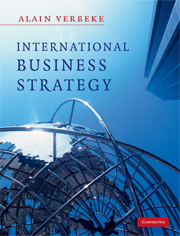Book contents
- Frontmatter
- Contents
- List of figures
- List of case studies
- About the author
- Foreword
- Acknowledgements
- List of abbreviations
- Walkthrough
- Introduction and overview of the book's framework
- Part I Core concepts
- Part II Functional issues
- Part III Dynamics of global strategy
- 11 Entry mode dynamics 1: foreign distributors
- 12 Entry mode dynamics 2: strategic alliance partners
- 13 Entry mode dynamics 3: mergers and acquisitions
- 14 The role of emerging economies
- 15A International strategies of corporate social responsibility
- 15B International strategies of corporate environmental sustainability
- Conclusion. The true foundations of global corporate success
- Appendix: Suggested additional readings
- Index
15B - International strategies of corporate environmental sustainability
from Part III - Dynamics of global strategy
- Frontmatter
- Contents
- List of figures
- List of case studies
- About the author
- Foreword
- Acknowledgements
- List of abbreviations
- Walkthrough
- Introduction and overview of the book's framework
- Part I Core concepts
- Part II Functional issues
- Part III Dynamics of global strategy
- 11 Entry mode dynamics 1: foreign distributors
- 12 Entry mode dynamics 2: strategic alliance partners
- 13 Entry mode dynamics 3: mergers and acquisitions
- 14 The role of emerging economies
- 15A International strategies of corporate social responsibility
- 15B International strategies of corporate environmental sustainability
- Conclusion. The true foundations of global corporate success
- Appendix: Suggested additional readings
- Index
Summary
This chapter examines Porter and van der Linde's idea that governmentimposed environmental regulations can enhance competitiveness by pushing companies to come up with innovative ways to use resources more productively and potentially develop green FSAs. In this way, environmental regulations can actually benefit the firms being regulated. Porter and van der Linde recommend that senior managers respond to environmental regulations by adopting a resource productivity approach (embedding new environmental initiatives into the production system), rather than a pollution control approach (just dealing in new ways with whatever waste the production system generates). The authors note that raising resource productivity is good for both the firm and the environment. These ideas will be examined and then criticized using the framework presented in Chapter 1.
Significance
In a classic 1995 HBR article, Michael Porter and Claas van der Linde argue that government-imposed environmental regulations can trigger innovative solutions to environmental problems, which may in turn lead to cost efficiencies or value enhancement. These positive effects at the firm or industry level are often sufficiently high to offset any costs associated with these regulations for the companies involved. The authors thus suggest that stringent environmental standards may lead to new FSAs.
If environmental regulations can indeed benefit firms, then senior managers should stop reflexively opposing new environmental regulations or attempting to delay their implementation, as such behaviour benefits mainly lawyers and consultants thriving under an adversarial regulatory regime with a strong litigation orientation, while doing nothing to solve the environmental problems at hand.
- Type
- Chapter
- Information
- International Business StrategyRethinking the Foundations of Global Corporate Success, pp. 419 - 450Publisher: Cambridge University PressPrint publication year: 2009



